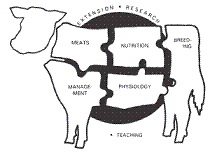Animal Science, Department of

Nebraska Beef Cattle Reports
Date of this Version
2022
Citation
2022 Nebraska Beef Cattle Report
UNL Beef, Institute of Agriculture and Natural Resources, University of Nebraska-Lincoln
Abstract
The objective of this experiment was to determine if dietary supplementation of high doses of vitamin E (alpha-tocopherol; 2,200 IU per day for 100 days) can impact quality attributes of wet and dry-aged beef strip loins. Steaks from beef cattle supplemented with high doses of vitamin E exhibited less lipid oxidation after wet or dry aging, took longer time to discolor during retail display, and sustained redder color for a longer period under retail display conditions compared to controls. Free amino acids related to positive beef flavor attributes were higher for dry-aged loins compared to traditional wet aged samples loins. In dry-aged beef, trained sensory panelists found fewer negative flavors in beef from cattle fed high doses of vitamin E compared to controls. Dietary supplementation of high vitamin E levels can reduce lipid oxidation during wet or dry aging, improve color stability during retail display, reduce off flavors and maintain red color for a longer period under retail display conditions compared to controls.
Included in
Large or Food Animal and Equine Medicine Commons, Meat Science Commons, Veterinary Preventive Medicine, Epidemiology, and Public Health Commons

